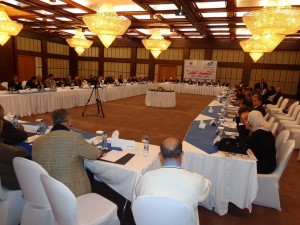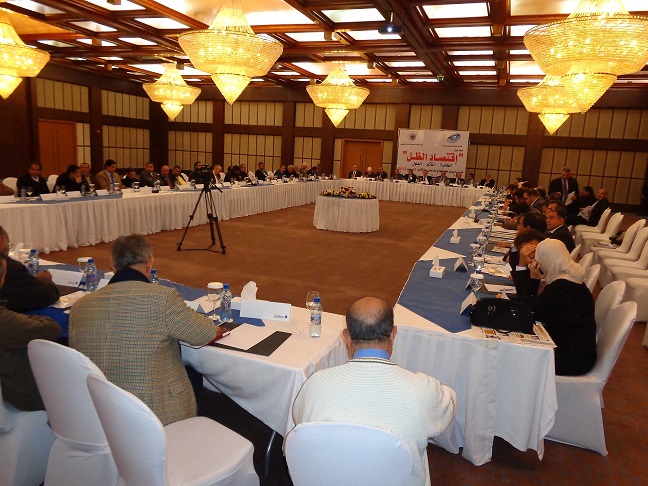By Sami Zaptia.

Tripoli, 9 December 2013:
The Tripoli Chamber of Commerce organized a conference on the “Shadow Economy – Phenomenon, effects and . . .[restrict]solutions” at the Radisson hotel, Tripoli today.
The conference was attended by the Economy Minister Mustafa Abufunas, the head of Tripoli Chamber of Commerce, GNC members, the Central Bank of Libya, representatives of Libya’s Business Councils, and numerous businessmen.
After a series of routine presentations on Libya’s shadow economy as well as international statistics and comparisons, the meeting turned into a critique of the Ministry of Economy and its lack of achievement under the current government’s term.
Various areas of the economy were raised by the participants including the Ministry’s lack of progress on numerous fronts such as the inflationary effect of increased wages and spending, Libya’s increased imports bill, subsidy reform on foods, fuel and electricity and SME funding.
Responding to criticism that the Economy Ministry was ineffective beyond organizing meetings and discussions, Minister Abufunas responded that meetings were necessary so that agreement can be reached as to what needs to be done in the economic sector.
With regards to criticisms regarding the inflationary effect of large government spending including increased wages, Abufunas said that the transitional stage that Libya finds itself in, forces the state to make large expenditures. He accepted that this is inflationary, but felt the government had no choice in the short term.
With regards to limiting imports or returning to the practice of restricting imports by imposing prior import licences, Minister Abufunas said that he could not go back to that practice in the new Libya. However he did concede that as a result of the current oil blockade and its resultant diminished oil revenues, the state might have to impose some kind of import controls.
“We may cause a problem in order to solve a problem”, the Economy Minister conceded.
With regards to the long promised review of business and commercial laws, the Minister confirmed that much work has gone on in the background on reforming the Qaddafi era business and commercial laws. However he said that due to the “current general situation” in Libya, the GNC has been delayed in passing the reformed laws.
Abufunas said that, for example, if a Libyan or a Libyan company wanted to practice in more than one business activity, they would have to under the current laws form a different company, or a number of companies.
The Minister said that he hoped that this would be changed allowing business people to form companies that can operate in numerous sectors. The Qaddafi era laws also prohibit the naming of a company using the owner’s name. This should be changed, promised the Minister.
This applied to both the shareholding and limited liability companies, the Minister explained, which he said should end the practice of the real owners of companies having to list fake partners to satisfy the old laws.
In conclusion, the Minister assured his audience that the government was convinced that wholesale reform of the economic framework was necessary. He confirmed that his Ministry was working on this through the Ministry of Planning especially with regards to the relationship between the private sector and the state sector. The Minister assured that he saw a reduced role for the state limited more to an oversight role in economic activity.
Ultimately, he explained to his critics that the Ministry of Economy was constrained in its ability to act by the limiting framework that it finds itself in currently.
[/restrict]









